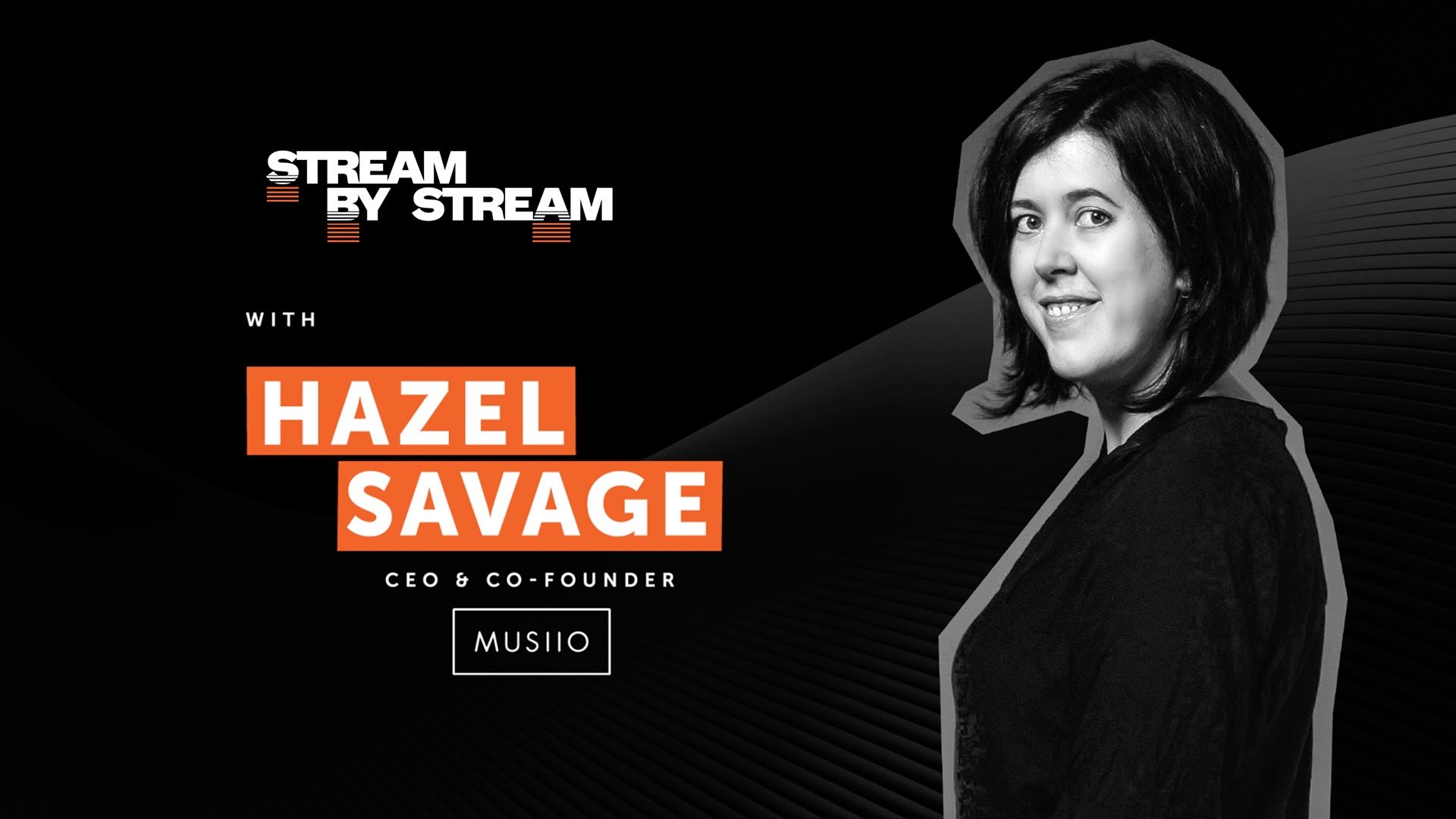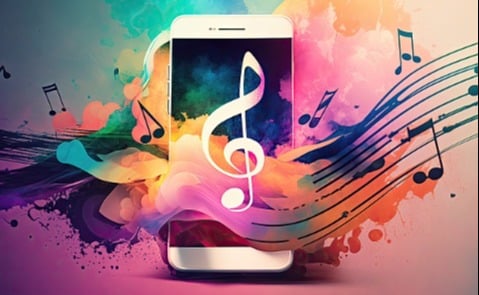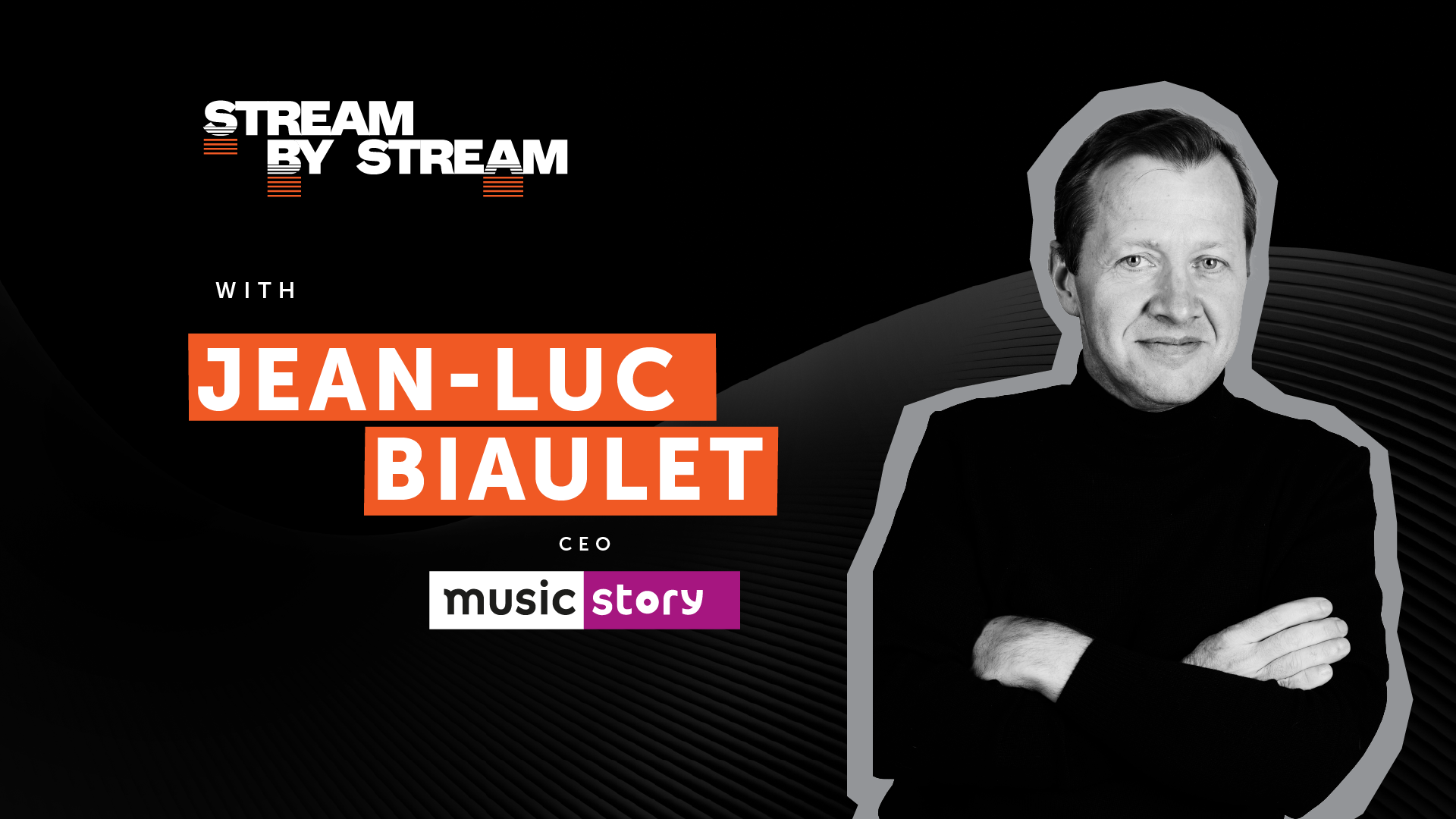 In this episode of Stream by Stream, Spiro Arkoudis, CRO of Tuned Global talks to Hazel Savage, the CEO and co-founder of Musiio about AI in music.
In this episode of Stream by Stream, Spiro Arkoudis, CRO of Tuned Global talks to Hazel Savage, the CEO and co-founder of Musiio about AI in music.
What is Artificial Intelligence in a digital music world? How does AI help personalisation and user engagement for a streaming service? How have companies such as Epidemic Sound improved their user experience using Musiio AI music technology?
You've been part of the music industry ecosystem for many years, from the labels to services. Could you give us a quick background?
My name is Hazel Savage, I'm the CEO and co-founder of Musiio, which I started 2.5 years ago with my co-founder. I've been in the music industry for about 15 years. My very first job was when I was at university and used to work in a HMV record store on weekends. I've also worked at other music companies and music tech companies, such as Shazam, Pandora, Universal Music, and a bunch of other startups that people wouldn't know about. So yes, I'm pretty consistent in the music tech space.
So for those in the music industry that hear about artificial intelligence (AI) quite a bit, how does that connect to the digital music world and where are the benefits? Could you break it down?
I always describe ourselves at Musiio as an artificial intelligence company for the music industry. But if you really want to boil it down, we're a data processing company and it just happens that the data that we process is audio and music data.
I often talk about how I started at a record store 15 years ago. I'm just old enough to remember that when new music used to come out, it was all released on a physical product on a Monday morning at 9am. If you wanted the latest song, you had to queue outside the store and there'd be maybe 2 to 5 new songs out on a weekly basis.
We've really gone from there in the last 15 years to major streaming services saying, "Hey, we've got 40,000 new songs a day being uploaded." The young people I speak to today say that they can't imagine a time when music wasn't just instantly available and accessible. Why was all music released on a Monday? That seems like a strange rule because now you can have music released 24/7, any time zone and it's globally available. So that's been a huge shift in the market and really Musiio is a response to that shift.
Now that you have the same amount of music coming out in a day that used to come out in a year. How do you handle that kind of volume? How do you manage that level of data?
That's really what we use artificial intelligence for. AI is a buzzword, but really what we mean by that is using computers to mimic something that looks like human behaviour. So if there are 40,000 songs that come out a day, a human (if they have the time) would be able to tell you the genre of each song. They would have to listen to the song to do it, maybe 1-2 times through, but that would be very tedious - listening to 40,000 songs would take one human being 83 days, 24 hours a day, assuming each song was three and a half minutes, which again is another rule that not everyone has to stick to these days.
So really what we're doing is we're automating that process, training an AI to be able to identify these kinds of characteristics without it having to be processed manually because the volume makes that no longer achievable. So that's kind of how the company started and where we based ourselves and the kind of challenges that we look at using this technology to improve the new ecosystem of the music industry.
Music streaming services have a high volume of music coming in each day, so AI allows them to clean up the data to get accurate information. What is the benefit to the end user? Does it help user engagement ?
As a company we're really B2B, we sell our services to other big music companies, but really the end user is the one in the value chain that should benefit from the experience. If I'm a streaming service with 40,000 new songs a day and I don't know what any of them are or their genre, then I have no way to be able to playlist them, recommend them or even allow users to search for them (unless they know the exact name of the song or the artist).
We have the ability to add metadata to audio files that don't come with it as a standard or that comes from various different places in various different qualities. The ability to generalise and create consistent and accurate data means that the client - such as streaming services - can create a better product.
While video streaming services such as HBO Go, YouTube Premium, Netflix or Amazon Prime all have different shows, all the major streaming services in the world have 40 to 50 million tracks, with probably 99% overlap on the content that people access. Your unique offering, your sort of unique gift to the customer is how well that content is curated and how good the experience of your product is.
So really AI helps streaming services to improve search experience and automated AI playlisting algorithms because they have the data to do so.
Outside of streaming services, you've tapped into companies like Amanotes in the gaming space, but also Music Library websites such as Epidemic Sound and Jamendo. Can you give us a little bit of an example, where the benefits were and what they were looking for as a brand?
I think Epidemic Sound is a really fascinating example because they have a more selective catalog than say a streaming service. Their plan is to grow their entire catalog, but when we started working with them it was around 30,000 tracks and they were actually doing some manual tagging. So for every track in their catalog, they had assigned one genre, one mood and a BPM. So each 30,000 tracks had those three pieces of data. That means that if I tagged a song as “rock”, the user has to specifically search for that word to get this in the results. Whereas somebody actually might mentally be thinking of this kind of sound but they're using the word “indie rock” or they're using the word “metal” or they're using “hard rock”, “alternate rock”, “classic rock”. So the more metadata you can attach to each track the more likely you are to be speaking the language of the end user. With just one genre per song, you don't give yourself the best hit rate. Musiio adds up to four genres per track.
Say Epidemic Sound already has it tagged as rock, then we tag it as “rock”, “indie rock”, “alt rock” and then maybe even something like elements of funk - maybe it's rock but there's a funky bassline. Now you instantly have so many more search parameters that mean the user can find what they want.
Epidemic Sound’s main users are videographers, YouTube creators, influencers and when they're looking for music for their soundtracks for the videos they're putting together, the ability to find what they want really quickly and to feel like that the search system is intuitive. That's really important. So even though Epidemic had tagging and even though their search system was already great, by augmenting it with more data, you open up the opportunity to a much wider audience.
It's easy to freak people out with the tech language these days. The bridge of record label content owners to a music service CD has changed dramatically in the tech space. Do you think most people get AI, especially relative to music?
We've been going for 2.5 years and I've definitely seen an improvement in the last 2.5 years in people's understanding and willingness to embrace new technology. However I still think there's quite a long way to go and quite a lot of what we do is educational around deep technology, because AI is still quite a scary concept. I always make sure to explain the difference between AI-generated music, which we are not, and AI to generate insights when I'm first speaking to customers. So my opinion of artificial intelligence is that it's excellent at doing very repetitive tasks that humans either are not good at because it's very tedious and boring, or don't want to do it because it's very tedious and boring. A computer doesn't get bored and it doesn't start to make systematic errors based on whether it's had its lunch or it's 3PM coffee.
AI can be an incredibly powerful tool. If the reality is that some of the record labels we work with have tens or hundreds of thousands of songs in their back catalog that they're not making any revenue from them because it's all untagged, unsearchable and unusable, then there's the opportunity.
But to me, and I made this very clear to people, kids want to learn guitar, people want to sing, people want to write music and no one gets paid for it. When I got my first guitar at 13 no one was paying me to learn how to play it, there was no immediate opportunity, but I did it because I wanted to do it. And so I don't think that creativity, when it comes to writing music, is something that needs to be replaced because there's no shortage of people that want to do it and there's no shortage of amazing talent. That's why I love AI when it comes to a heavy lifting perspective. I think AI for creativity is a very interesting academic proposition, but I think it's got limited use within the genuine creative industries and is part of the education. A lot of people see AI, they see music, they get on a call with me, they think I'm trying to take out all their jobs and that's not what we're doing at all. So I like to be very clear about this usually with our customers upfront.
Do record labels get the real advantage of AI, and does it have a ripple effect?
Yeah, there's a really fascinating example of a client that we have in South Africa. The client that we have is actually a digitalisation agency, but their customers are Universal Music Africa and Gallo Records. I've heard of this multiple times, where catalogs exist only either on CD or vinyl, so someone will be brought in to physically take the actual item, say the vinyl, digitalise that into an MP3 and then they'll also use the Musiio product to attach the data from the start of the digitalisation project. So there is still a lot of content and a lot of long tail catalog out there that is that early on in the stage. It's tough enough that you have to use a vinyl to MP3 encoder and that has to be done manually, but then at least if we can add all the genres, the BPMs, the data, the moods, to the audio files as they're being generated, you certainly save a lot of time in the long run. So it's really everything from taking stuff that's only on vinyl all the way up to the most advanced streaming services in the world who are looking for very cutting edge uses of data.
At Tuned Global we talk to streaming services, production companies, and the gaming sector. Since 2020 we are seeing interest from the fitness space and other verticals wanting to tap into music. Are you seeing the same from Musiio's side with a lot of industries that can tap into the music ecosystem, but also the AI piece?
I almost don't want to go as far to say that music is a pandemic proof industry, because certainly with live music that's very much not the case, but when it comes to recorded music and streaming music, a lot of platforms have seen an increase in usage and a doubling down on this part of the business. If it's a fitness company and people doing workouts from home, how do you provide that service in-app? How do you provide an experience that replicates to many people versus the old school method of showing up to a fitness studio and there's one CD and it goes in the player? So it's about expanding the capabilities and music is a huge part of that. It's definitely something that people have engaged with more highly during lockdown periods, and it's also something that the big industry players have also taken the opportunity to kind of double down on during the pandemic. Big companies can see each disaster as an opportunity at the enterprise level, so a lot of people have been kind of doubling down on, and thinking, we've got a year to really work on having the best product and creating the best experience for the user because more users are now tuning in. 2020's been a really interesting year from that perspective.
Lastly, where can anyone see you next? Where can they hear more and find out more?
I always share my speaking events and calendar on the Musiio LinkedIn. We also have a newsletter that we send out once a month that has our calendar of events and how you can try all of our products. Anyone can sign up for that at musiio.com. So, very happy for people to get in touch.
Stream by Stream is a Vlog produced by Tuned Global to share expert insights about the streaming industry and how to launch and grow a powerful streaming service.
Musiio technology is fully integrated with Tuned Global and can be used by our White Label streaming app clients or Streaming Service APIs clients to refine their catalogue metadata and improve the user experience in their streaming apps.
If you found value or insight from this post, please consider sharing it on Twitter or Linkedin. Thanks for reading!
Follow Tuned Global and always be in the know.
Follow @TunedGlobal





